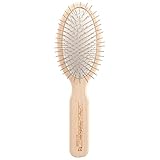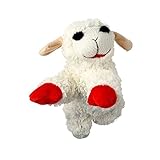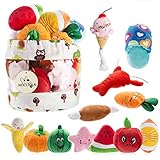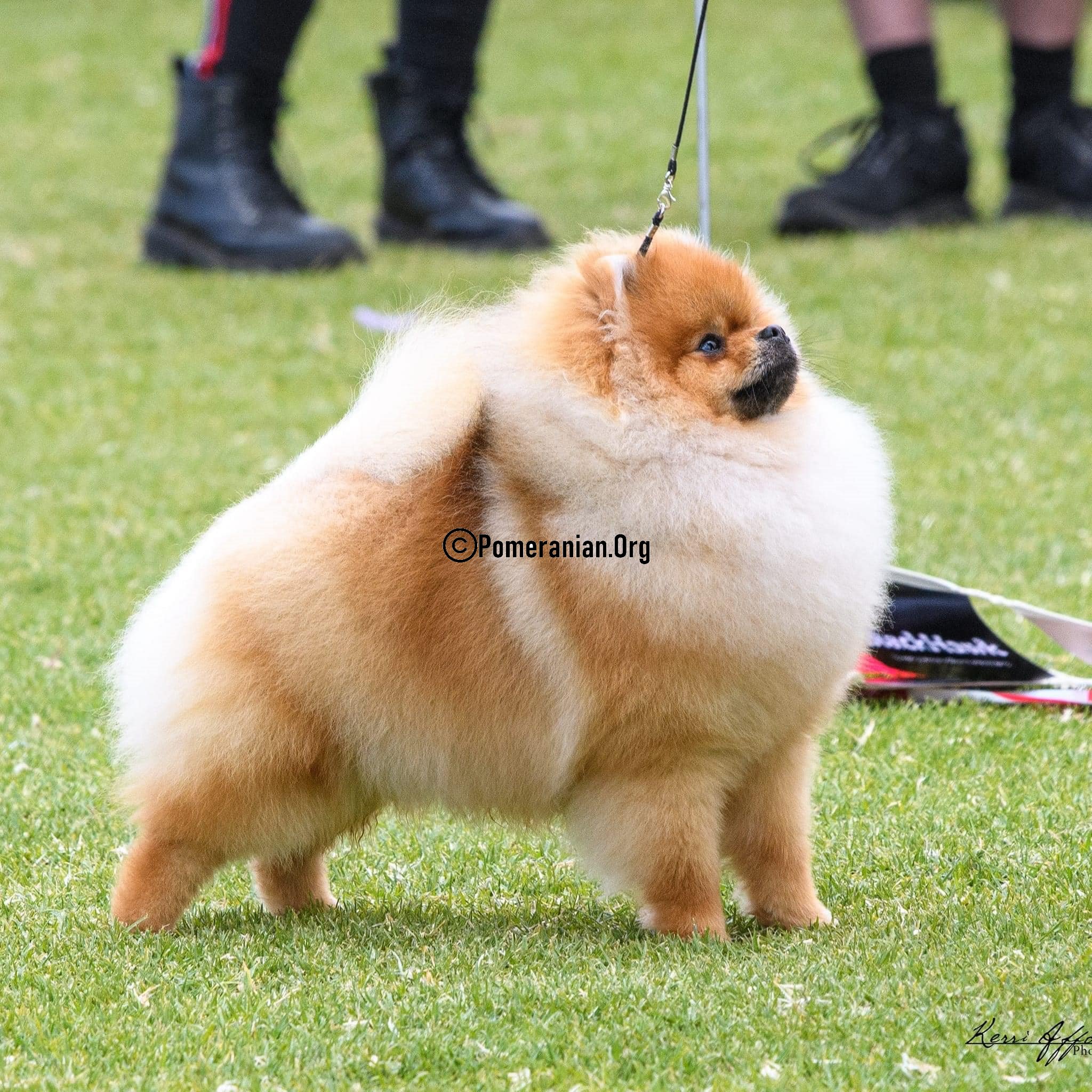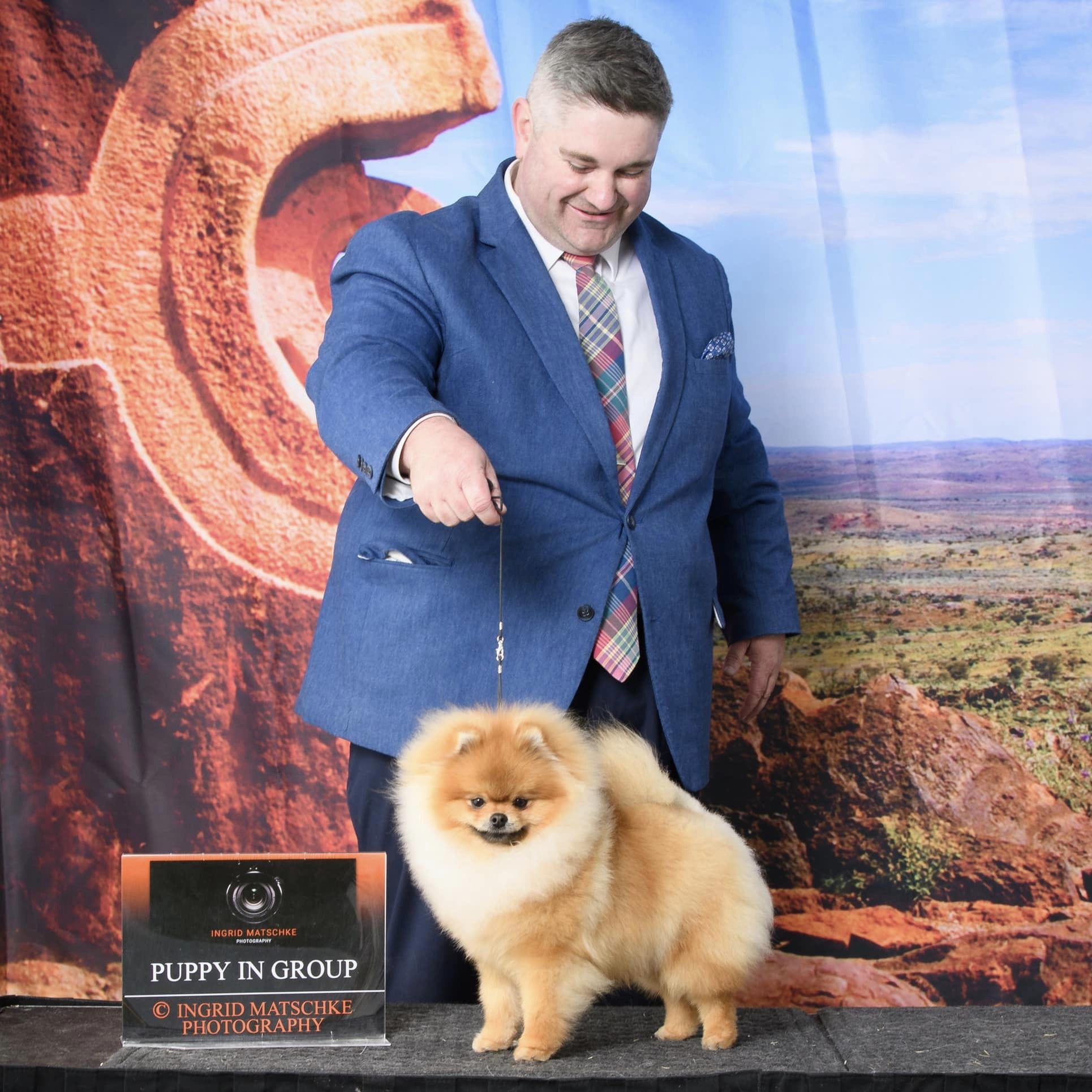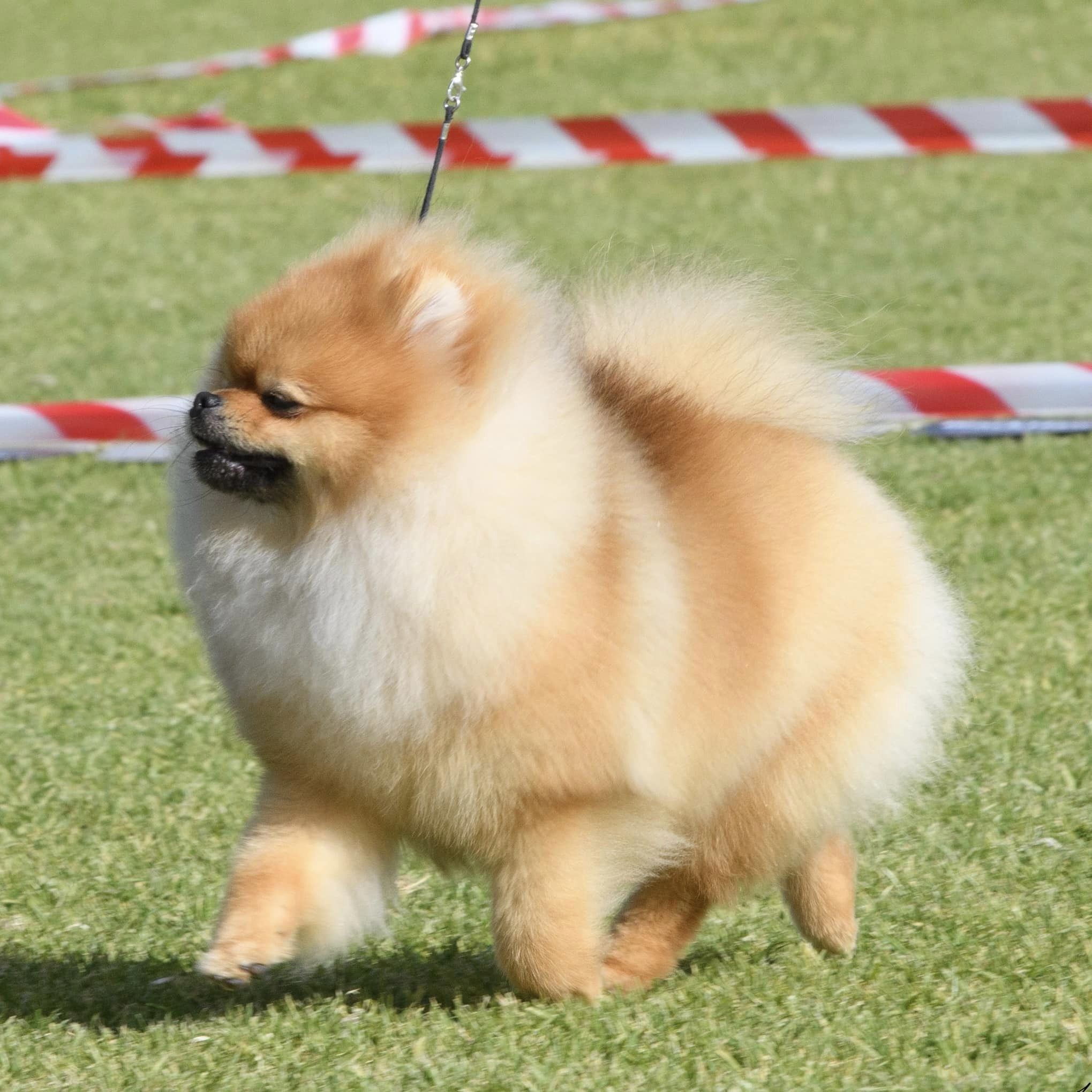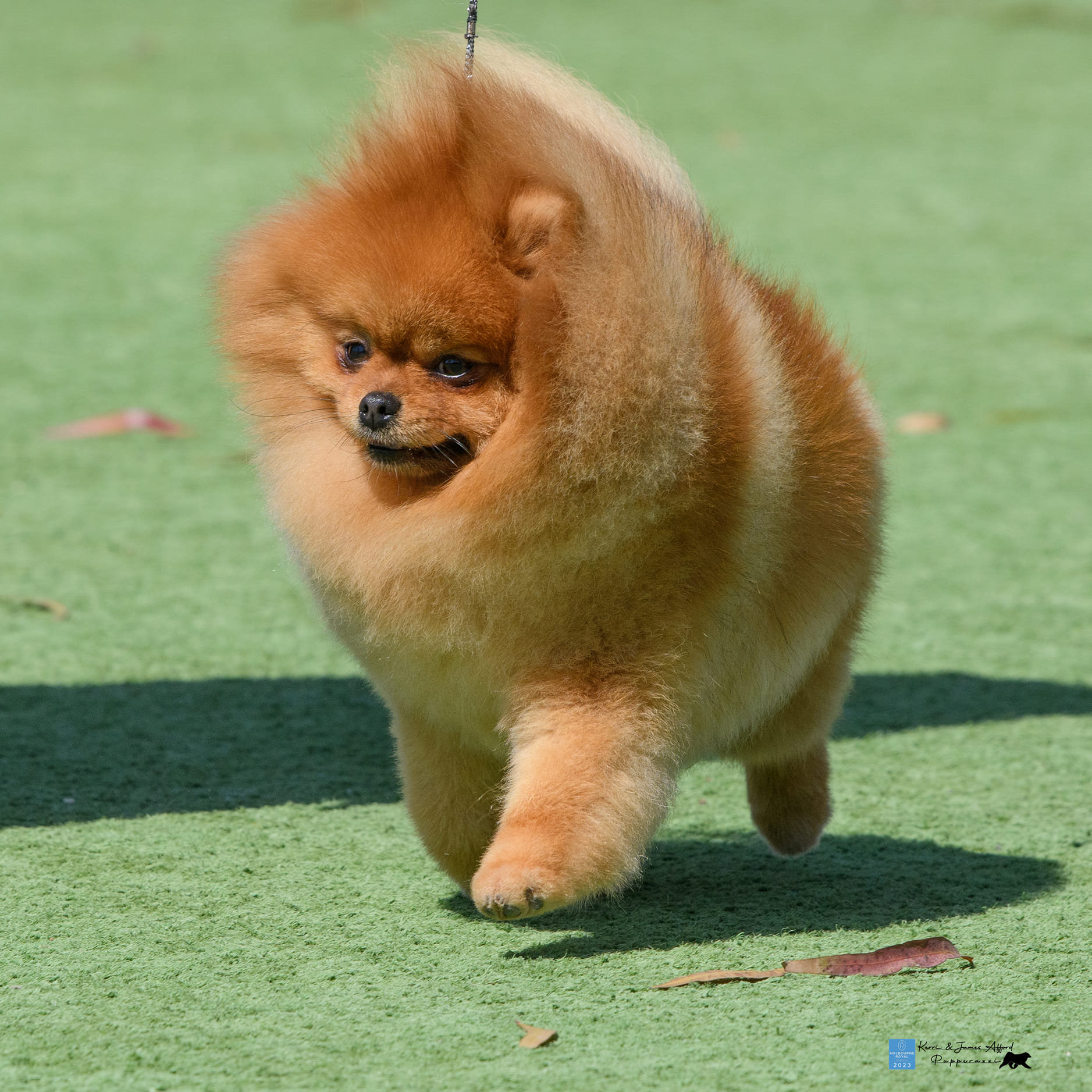Last Updated on 24/04/2024 by Denise Leo. Post first published on May 20, 2019.
Are You Getting a Pomeranian Puppy? You and your family may be thinking about getting a new addition to the household in the form of a new Pomeranian puppy. However, it would be best to think it through before making any decisions. Your current pets (regardless of whether they’re cats, dogs, or both) won’t be happy when you first bring that puppy home.
A young Pom puppy will need lots of attention because he’s a stranger to you, your human family, and your animal family. A puppy can annoy other pets because he’ll do whatever he wants, including stealing their toys, going potty wherever he desires, and making a general nuisance of himself.
It can take six months, or even longer, in some cases, to train your puppy properly and get him used to your other pets and how the household is run.
First Night With a New Puppy Pomeranian
A pom puppy’s first night in a new home can be very unsettling for a puppy. He’ll meet other family members and your other pets and must adjust to life in a brand-new environment. He’ll have a couple of meals, so he’ll be confident that he’ll be regularly fed.
When it comes to bedtime, he’ll most likely be too excited and nervous to sleep now he’s in your home. You can make him more comfortable at the beginning of his new life with you and your family in many ways. Please set up a specific time and routine for putting him to bed from the first night.
These tips will make that task easier to manage:
- Puppy Pom should have his final meal 30 minutes before bedtime. In older dogs, this should be a snack instead of a meal.
- Ten minutes before bedtime, take him outside for a toilet break to avoid problems during the night.
- Finally, you should take him to where his bed is set up and ensure he’s comfortable and has all he needs.
- Go to bed yourself, or at least try.
- If your Pomeranian is anxious because he’s in a new home and can’t sleep, read further to learn what to do for him.
If he wakes up during the night, take him out to the bathroom again. This isn’t playtime, so don’t make it one. Otherwise, he’ll want to play every night. Set your alarm clock, so you decide when to take him to the bathroom instead of him dictating terms.
This may occur a few times a night but should eventually settle down.
Reducing Anxiety over Puppy’s First Night in New Home
You put your new Pom puppy in his crate and wish him goodnight. Then you turn off the lights. Is your new Pomeranian puppy sleeping all night without any noise? This may be the case, but it’s common for pom puppies to feel lonely and afraid.
Is Your New Pomeranian Crying At Night?
Is your Pomeranian whining at night? So he’ll do what most puppies would do, and that’s cry and scream until he gets some attention from you.
Why Do Pomeranians Cry?
He wants to be reunited with his previous family. You can’t imagine how your new pom feels, that abrupt separation from his home and family, the two factors that have kept him secure for his whole life until that point.
The Pom Breeder should separate the puppies for periods that grow longer and longer before being sent to a new home. This helps reduce your puppy’s feelings of abandonment when he’s uprooted and given to new owners, no matter how nice you are.
Pre-owned and older Pomeranians generally feel nervous when moving to a new home they don’t recognize. Put yourself in your puppy’s shoes. You’d also feel anxious and stressed if you were suddenly forced to move to a different place with new people.
How to Comfort a New Puppy Pomeranian:
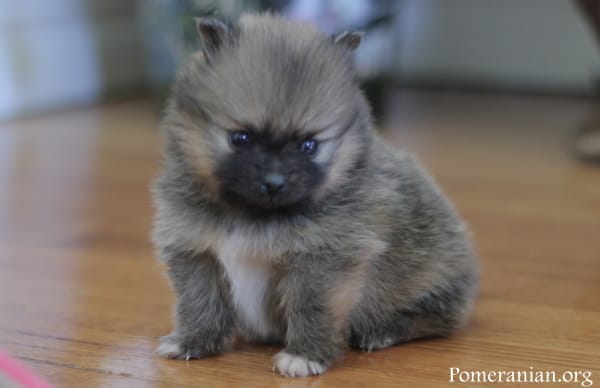
What to do when a puppy cries at night:
- Create a crate or space your new puppy can call his home. Include things he likes, such as his toys, a blanket, cushion, water, snacks, and food, so he’ll feel more comfortable.
- Don’t always come running during the night whenever your Pom puppy makes any sound. If you do, he’ll learn how to get you to come, and you’ll end up coming and going frequently.
- Don’t ignore him, either. This makes him feel more isolated and may contribute to feelings of anxiety and being separated. This certainly doesn’t mean you should come running at the slightest sound. It means you attend to his main needs, comfort him, and then place him back in his crate.
- This is similar behavior to the way you treat a new human baby. Although your puppy’s crate or space may be at the other end of your house, it’s natural that he’ll feel alone and lonely during the night while everybody is asleep.
- In the early stages of getting him used to settling into your home, you may need to set up his temporary bed in your bedroom, maybe for a few nights, until he gets comfortable and calms down at night. However, there’s no reason to allow the puppy to sleep in or on your bed. It’s unwise due to safety concerns (among other things).
Tips On Easing Tension Between Pets
It’s wise to make a confined area to keep your puppy. If it’s currently the area where you feed your pets, change the feeding area so it’s away from the puppy and is in a quiet place. This must be done a week before bringing the puppy home so your pets get used to it.
The same thing applies to caged pets and litter boxes. This planning will help eliminate potentially negative thoughts about this new family addition.
Your Pets Need to be Fussed Over More Than Normal
Make a big fuss over your current pets so they don’t feel you’re ignoring them.
Here are a few tips to help you achieve this: If you have to feed your puppy three times daily, do the same with your other pets and split their meals so they’re not getting more than usual. Feed your existing pets before your puppy.
- You should play with, give treats to, and generally respect your current animals so they don’t feel ignored by the “intruder.”
- If your pet is a dog, allow him to enter/exit rooms first.
- If your current pet comes to you while you’re attending to the puppy, turn around and give immediate attention to him, ignoring the puppy.
- Never let a puppy attempt to grab your attention if you’re busy with other pets.
How To Introduce Your New Pomeranian Puppy to Older Dogs
If you have had one or more dogs for a few years, they’ll feel territorial and won’t like sharing your home with the new Pomeranian pup or what they probably think is a little “intruder.”
At first, it’s best to have your dogs and the puppy in a neutral space outside and then introduce them slowly. It would be best if you remained calm, and your current pet needs to be the main focus of your affection.
Follow These Tips:
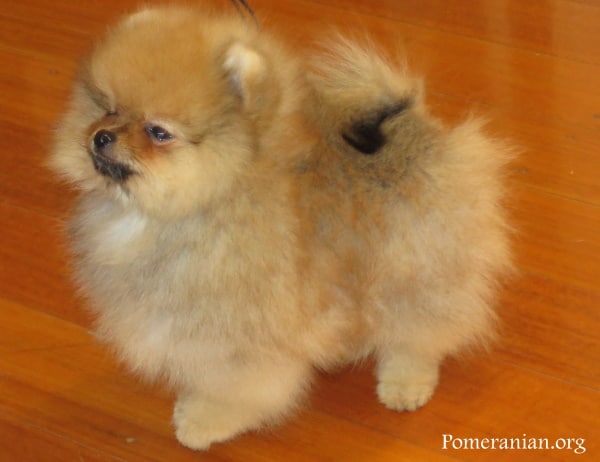
Choose the time for the introduction when your current pet is relaxed and calm. You need two people. You have your dog on a leash. Somebody else has the Pom pup on a leash. That way, you keep control of the situation.
Give your dog plenty of treats as you solely focus on him. After you feel your dog will accept this new family member, ask the other person to carry the puppy into your home.
If you’re worried about how your dog will react once he and the puppy are inside your home, put the puppy in his playpen or crate. You give your dog 100% of your attention and pretend the puppy isn’t even there. Remain calm while the dog and puppy check each other out, and you stay focused on your dog. If interactions get rough, your dog will use body language to tell the puppy who’s boss. Watch as it all happens while remaining cool and ever-vigilant.
Another way of doing it is to start outside again and allow the dog and the puppy to “say hello.” Then, indicate to your dog that he can lead the puppy into your home. If you’re seriously worried that your dog may cause harm to the puppy, you can muzzle him or grip his leash tightly so you can pull him back if necessary.
Introducing Cat to Puppy Pomeranian
Cats need to be introduced, too. The majority of cats prefer not to have puppies in the same house. If your cat has a lot of confidence, he’ll most likely wait patiently until the puppy gets near enough so he can give the puppy a good slap across the snout. Don’t overreact.
Stay relaxed, or you can make your pets feel stressed. Put the puppy in his crate (and have a toy or two) for him to play with. Let your cat do what he wants (as most do). Never force a cat and puppy to be friends. Eventually, they’ll become great friends, or the cat will stay out of reach.
Before you bring your Pomeranian pup home, there are supplies to buy, and your house needs to be Pomeranian-proofed. If your Pomeranian is spending time in the backyard, you will need to ensure the yard is secure and that there is no area where the puppy can slip through the fence. Make sure no other animals that could harm your Pomeranian can get in.
Pomeranians are only small dogs and should live in the house with their families. They enjoy companionship and can get lonely. A lonely Pomeranian can be a destructive Pomeranian.
Pomeranian Puppy Supplies
You will need to provide a place for your Pomeranian to sleep. Buy a small dog bed of unchewable hard plastic that is just big enough for your dog. A zippered bed cover will allow you to remove and wash it when needed. Place the bed next to your bed or where you want it to sleep.
If you prefer to have your Pomeranian sleep in another room, start him out sleeping there. Don’t let him sleep in your room for a couple of weeks, and then try to switch him. This will only lead to frustration for you and your dog.
You will want to buy a collar and a leash so that you and your Pomeranian can go on walks. I prefer the use of a harness and a leash for a Pomeranian. This will also ensure he is safe when you visit the veterinarian.
Feeding dishes is important. You will want one for food and one for water. Avoid plastic dishes. Choose a small size suitable for your Pomeranian. Ensure they stay clean between feedings and the water is always fresh and available.
- Full Dinner Set – Set of 2 Dog Bowls (S:6.9 OZ for each bowl,designed for 【PUPPY VERY SMALL DOGS and CAT (TINY PET) 】★★;M:13.9 OZ for each bowl,designed for small medium dogs and cats;L:29.8 OZ for each bowl, designed for medium dogs, cats and other pets;XL:50.8 OZ for each bowl, designed for large dogs,cats and other pets). Works as a full dinner set with food and water for one. your pet will definitely love this versatile feeder. Double bowls also allow you to feed two pets at same time.
- Safe Food Grade Material – Our dog bowls are made of food grade stainless steel and BPA Free silicone mat, This is a fantastic dog cat puppy food and water dish to prevent messy eating and drinking! Handy all in one feeder for messy pups, new puppy or Small Medium Large dogs.
- Double Dog & Cat Bowls – Set of 2 Stainless Steel Dog & Cat Bowls for messy eaters, one for water and another for food. The bowls is made of high quality food grade stainless steel which makes it rust resistant and anti-corrosion. The non slip stainless steel pet bowl is durable for long-term use and healthy for your beloved pets especially for holding hot food, and easy to clean, easy to detachable from silicon mat and dishwasher safe.
- No-Spill Silicone Mat – The raised silicone mat edge can catch most spills and splashes and keep your floor clean, Keep Bowls staying in the same place when your boy or girl dog is eating.The flexible silicone mat is foldable for travel and storage.
- 【Package】:Include a pet food scoop.
- [Bowl Size] Top diameter 6.5inch (16.5cm), bottom diameter 8.7 inch (22cm), Height 2inch (5.3cm). Holds up to 16oz each, perfect for dry kibble, wet food, treats, or water
- [The design of the dog bowl] High quality stainless steel material bowl, polished to a mirror sheen, no rust, corrosion and oxidation resistance, healthier for your pet. The unique design makes your pets love it more. By widening the bottom of the design, the bowl will be more stable to ensure that it cannot be poured
- [Durable and Advantage] Perfect design, dishwasher safe, and odor free, smooth and easy to clean. Non-toxic anti-skid rubber base prevents spills and mess
- [Rubber bottom] The anti-slip rubber is detachable for washing convenience. The dog’s stainless steel bowl rubber bottom can effectively reduce the noise and slipping when your lovely pets in eating, and it can also protect home wood floor from scratching.
- [First-class service] Purchasing from us, you will get high quality bowls as you wish. If you are not satisfied for any reason, please send us an email via Amazon, we will solve it and reply you within 24 hours
- 【Material Matters】A bowl is just a bowl, right? Sadly, that’s not the case. Most pet food bowls are made from stainless steel, plastic, ceramic. Plastic is the worst option which contain chemicals that could disrupt an animals hormonal balance. Apart from that, plastic accumulates deep scratches that harbor insanitary things and can be hard to clean. Ceramic is heavier and far less durable. One drop or bang can chip, crack, or shatter your ceramic bowl, making it no longer safe for use.
- 【Rust Resistant & Rubber Bottom】Made from genuine stainless steel. If properly cared for, your stainless steel dog bowl will last for years. Regular metal bowls that try to pass themselves off as stainless steel when they are actually regular steel (carbon steel) will rust in no time. The added slip resistant rubber rim on the bottom prevent the bowl from sliding around and reduce noises while your dog eats.
- 【Easy to Clean & Dishwasher Safe】Dog bowls made out of stainless steel can easily be cleaned with mild dish soap and warm water. In addition, they are also dishwasher safe, making for easy cleanup. Besides, the rubber ring can be removed to wash these bowls thoroughly in the dishwasher.
- 【Stackable Design for Easy Storage or Travel】With a considerate and convenient design, these bowls stack easily inside one another for easy storage or travel. Durable for long time use and healthy for your beloved four-paw companions.
- 【Dimensions & Capacity】Small Size: Holds 1.5 Cup/12 fl.oz for each bowl(5.3″ Dia x 1.9″ H); Medium Size: Holds 2¼ Cup/18 fl.oz for each bowl(6.3″ Dia x 2.4″ H); Large Size: Holds 3¾ Cup/30 fl.oz for each bowl(7.5″ Dia x 2.4″ H). Capacity is calculated by total volume. When using container, choose a capacity greater than what you need to prevent overfilling and spills.
- Stainless Steel Light Weight Small Dish ideal for small sized Dogs
- Comes with polished interior and exterior finish
- 16 ounce capacity. Bacteria resistant.
- Loving Pets Bella Bowls feature a stainless steel design with a poly-resin exterior, which makes them dishwasher safe and easy to keep clean and hygienic
- Features a removable rubber base, helping prevent your dog from nosing their bowl all over the floor and causing noise or spills
- Bella Bowls offer a healthy alternative to plastic with a design that is rust-resistant and doesn’t hold odors
- Stainless steel dog bowl comes in 9 colors that reflect a stylish, sophisticated look that works well with all kinds of decor
- Patented, award-winning design is known for being the bestselling bowl in the pet industry
- Healthier Dog and Cat Feeding: Elevated dog bowls promote healthy eating and drinking habits by enabling food and water to pass easier through the dog or cat’s digestive system
- Reduces Eating Stress: Raised dog bowls and cat bowls allow pets to access their food and water at a more balanced level which takes stress off of the dog or cat’s neck and joints
- Safe And Convenient: Anti-slip dog feeder or cat feeder stand with non-skid, non-slip rubber feet which prevents and protects from spills and scratching; includes dishwasher safe bowls that are easy to keep clean
- Decorative And Functional: Raised stoneware dog bowls or cat bowls are designed to match with modern home décor; extra utility with removable microwave safe bowls
- Sturdy Raised Pet Feeder Stand: A durable steel raised feeding tray secures the included stoneware pet bowls and offers a stable raised surface for pets to eat and drink
- BUILT TO LAST: durably designed silicone mat and stainless steel bowls are built to last; a convenient finger notch provides easy access to the dishes, making it simple to access and remove the bowls when filling with food or during cleaning
- NO MESS, LESS STRESS: help prevent spills and messes with the two in one bowls and feeding mat; a raised edge around the border catches overflow and helps contain spills, effectively keeping your pet’s mealtime mess off of your floors
- SLIP AND SCRATCH RESISTANT SILICONE: the mat is constructed from scratch resistant silicone that helps to protect your floors from dragging and scratching; the silicone mat works as a base to keep bowls standing securely in place; we recommend use on clean, dry floors to prevent movement; aggressive eaters may be able to lift or drag mat
- DISHWASHER SAFE FOOD GRADE MATERIALS: rust resistant stainless steel bowls and 100% silicone mat are dishwasher safe for a fast and easy clean; to wash simply remove the bowls from the mat; we recommend washing bowls on the top rack of your dishwasher; bowls and mat are BPA free and third party tested
- LARGE CAPACITY BOWLS: feed your pet the perfect portion every time; the stainless steel bowls in silicone mat comes in 5 convenient sizes; 1 cup, 2 cups, 3 cups, 4 cups, and 6 cups, so you can find the best capacity bowl for your pet; 1 cup mat measures 12.9in × 8in × 1.3in; consult with a vet or dog food manufacturer to determine the ideal amount of food for your pet
- Whisker Friendly: Oval shaped cat and dog saucer specifically designed to alleviate stress on cats or dogs that experience irritation when whiskers contact bowls while eating or drinking
- Designed For Pets: Long and shallow oval style bowl enables a cats, small dogs, and kittens to easily reach food and water while keeping their faces clean and dry
- Safe And Hygienic: Made of hand crafted 100% ceramic stoneware and glazed to form a non-porous shield. Made to FDA standards
- Unique Design: Decorated with our paws around the perimeter of the bowl and a paw logo in the saucer basin adds to home and kitchen décor
- Organizes Pet Dining: Ideal for both food and water including wet or dry cat and dog food
- FULL SET: Use the set of 2 Navaris ceramic pet bowls to give your dog or cat food and water during any meal time – indoor or outdoor. The bowls are suitable for wet and dry food, treats and water.
- LESS MESS: The bowls are elevated by a metal stand that provides comfort for your pet and keeps food off the floor.
- DETAILS: Each small bowl has a capacity of 10.8 oz (320 mL) and a diameter of 5.1 inches (13 cm). The stand measures 11.4 x 5.3 x 2.4 inches (29 x 13.5 x 6 cm).
- PAWTASTIC DESIGN: Delight your hungry puppy or kitten with food and water dishes featuring cute paw prints at the bottom of each bowl! This stylish and classic design in black and white will blend in with any decor in your home or kitchen.
- CLEANING: Ceramic bowls are durable and environmentally friendly, yet so easy to clean! The twin ceramic bowls are dishwasher safe for the easiest of clean-ups.
- Award winning, patented Bella Bowls are the BEST SELLING BOWL in the pet industry – and for good reason! Functional and beautiful, Bella Bowls are truly the perfect pet dish. Loving Pets brings new life to veterinarian-recommended stainless steel dog bowls and pet feeding dishes by combining a stainless interior with an attractive poly-resin exterior. A removable rubber base prevents skids and spills, eliminates noise, and makes Bella Bowls fully dishwasher safe
- Vet-recommended stainless steel interior
- Includes all the benefits of stainless steel
- Removable rubber base prevents skids, spills and noise
- Dishwasher safe (remove rubber ring)
Pomeranians love to play, so don’t forget to buy a special toy for him. Make sure it is suitable for a small dog and not easy to tear into millions of pieces he could choke on. Check for pieces that could be ripped off and swallowed.
A small pet carrier is a necessity for car travel. Use puppy pads, newspapers, or a puppy potty.
- 【Super Absorption & Leakproof】Great material of 4 Layers prevent urine outflow and dry faster.Super absorption high density middle layer
- 【No-slip Bottom Puppy Pads】Non-slip bottom. Dog pee pad special bottom PVC epoxy resin keep the dog pads stable,slip-resistant backing will help keep your floors dry while staying in place
- 【Reusable &Machine Washable】This is a reusable training pads for dogs, made with washable fabric reusable even after many times of washing. Washable pads, no shrinking even washing many times. It is easy to clean it, you can use warm water to wash it and dry
- 【Save Money & Eco-Friendly】Washable and reusable 120 of times,a must for any kind of puppies and kittens.an excellent economic and environmental choice saving money. These dog pee pads can protect the environment, beats buying endless bags of wee wee pads
- 【Multiply Functions】Our puppy training pads for dogs playpen, crate, bed cat litter box,ultimate protection for floor,carpet ,bed,furniture,sofa, car seat and car trunk, what’s more, Soft surface materials polyester makes ultra waterproof also be used as feed pads underneath the water bowl for indoor and outdoor.
- Washable & Reusable – Our washable pads are durable and long lasting, multiple washes. This 36″ x 36″ Large washable pee pads for dogs are reusable. The sizing is perfect for any breed or size dog. [PLAYPEN NOT INCLUDED!!]
- SUPER THICK GREAT MATERIAL OF 4 LAYERS – Polyester knitting surface for ultimate comfortable; Breathable waterproof PUL inner layer; polyester knitting fabric with anti-slip silica gel bottom. [PLAYPEN NOT INCLUDED!!]
- ANTI-SLIP BOTTOM – There are a great deal of anti-slip silica gels on the bottom side of the fabric. [PLAYPEN NOT INCLUDED!!]
- REUSABLE PEE PADS FOR DOGS THAT ARE EASY TO CLEAN – Being machine washable dog pee pads washable design makes cleaning up your waterproof dog mat after pet messes easier than ever. For proper care & to get the longest life of our pet pads for dogs lay flat & air dry your washable pet carpet after cleanintravel.
- New Upgrade Super Absorbent & Leak-Proof Mats – Personalized pet mats are super absorbent and leak-proof, friendly to your floor or environment, Environmentally friendly and reusable machine washable pet mats, allowing you to save more money.[PLAYPEN NOT INCLUDED!!]
- Perfect for pee-trained puppies, adult dogs and incontinent senior dogs. 100% waterproof and can be used on floor, carpet, bed, sofa, car trunks, etc.
- Adopt human-grade fabrics that have passed OEKO-TEX safety fabric certification to provide the highest level of protection for your small family members.
- The bottom layer is 100% waterproof, and the surface layer can quickly absorb water; it can not only maintain a dry environment, but also protect the furniture.
- Thick fabric, warm and non-slip; Small puppies, pregnant pets and incontinent dogs especially need a soft, thick shelter to avoid catching cold, falling and other accidental illnesses.
- Machine washable, reusable, easy to dry, recommended to use low temperature setting for drying.
- 【Fast Absorption & Leakproof】4 thickened layers prevent urine outflow and dry faster. The super absorbent top layer can quickly absorb urine and odor within 2-3 minutes. Our whelping pads can effectively prevent urine from leaking to the floor, no leakage and no smell, keep puppies and floor clean and dry.
- 【Anti-Slip Bottom & Soft Material】There are a lot of non-slip silicone gels on the bottom of the puppy playpen pad. The non-slip, leak-proof backing can effectively prevent the dog pen mat from sliding and keep the floor dry. Soft and durable surface polyester material no pilling and easy to clean.
- 【Save Money & Eco-Friendly】Washable and reusable 100 times, saving money and protect the environment. Our pet training pads air dries quickly, TPU waterproof coating keeping dog mats stand up to repeated cleaning by the washing machine, not easy to be torn by dogs. Save us a lot of work to dealing with the mess while dogs, beats buying endless bags of disposable pads. Disposable pee pads are harmful to puppies and the environment.
- 【Easy to Washable & Durable】Easy to clean. Wash it with hand or washing machine. Dry the puppy mat at low heat. Doesn’t shrink. Durable washable pee pads, long-lasting, multiple washes(keep same good leak-proof effect). The sizing is perfect for any breed or size dogs.
- 【Multi-Use】Our waterproof dog mat can be used indoors and outdoors. Pee pads for dogs can be used to protect floors, car seats, sofas, and pet beds. The mat can be used as dog training pads, whelping pads, puppy playpen mats, and play pads for dogs. Put it in the puppy playpen area and pet crates as well.
- 【Octagon Dog Pee Pad】- Zhilishu Dog Playpen Mat is in an octagon with 3 sizes to fit 29′ 36′ 48′ playpen crate kennel for most pets like puppy dog cat kitten and so on. You can put it in your dog or cat playpen to reduce chaos and greatly save time cleaning game pens and floors.
- 【Washable & Eco-Friendly】- The pet pee pad for octagon playpen is durable and machine washed many times without shrinking and quickly dried after washing, leaving no odor. Reusable playpen pads will save you a lot of the cost of disposable urine pads and are also environmentally friendly. Warming Tips for buying 2 Packs which allows you replace the dirty one and your pets can go right back into a clean and cozy playpen while the other is in the wash.
- 【 Leak-Proof & Anti-Slip】- Advanced breathable waterproof TPU inner layer ensures that urine does not leak and keep your floor dry and clean. Dog playpen whelping pad with grip points on the bottom of the anti-slip silicone dots, effectively preventing the mat from slipping on the floor.
- 【Super Absorbency】- Pet puppy pee pad playpen pad with excellent fast absorbency can accommodate a large amount of liquid , which avoids liquid overflow diffusion of the situation and creates a clean and comfortable playpen for your pets.
- 【 For Multi-Purpose Use 】- These pet pads are more than just potty training supplies. In addition to be great for house-breaking and potty training pets, it can be used for incontinence, feeding pads, crate liners, playpen, kennel pads. Dog playpen liners protect your furniture floor can be used for your dog, cat, guinea pig, rabbit.
- 【Washable & Reusable Durable】: Reusable pee pads for dogs can be hand-washed or machine-washed repeatedly,very economical for pet owners and environmentally friendly for our environment. And it’s very economical and practical。And it can be easily folded and carried.Please remember to clean and dry at low temperature or natural drying.
- 【Durable 4 Layers Protection & Leak Proof】: Durable 4 layers protection of dog pee pads, tear-resistant, tough and durable, Breathable waterproof PUL and high density inner layer which absorbency better without leak, faster infusion and absorption of liquid. No more sprinkles on the wall or wet footprints on wooden floor. Please note that : When removing from bed,gather all four corners and lift while supporting bottom of the pad Stay Strong
- 【Multi-Scene Applications】: Dog pee pads are suitable for any breed or size dog. The dog pads are perfect for housebreaking, training puppies, protecting crates and carriers, kennels,playpen,whelping, cat litter box,post-surgery, and incontinence. They are also an ideal for protecting carpet,woodfloor,sofa,furniture,car seat and car trunk during travel.
- 【Safety & Non-Slip backing Design 】: The anti-slip silicone design of the bottom layer allows the waterproof dog mat to stay on the floor or carpet, keeping your pet safe. Puppy pee pads also protect your floors and furniture from scratches and dirt, providing a dry and comfortable home environment.
- 【100% Quality and Service】: whiMsiGlo is a professional supplier of pet supplies, we are devoted to providing customers with high-quality products and the best shopping experience.if you have any issues , welcome to contact us via email, We will do our best to assist you within 24 hours
- 【Water Absorption & Odor Control】Dog pee pads with 4 layers of thickened fast absorbing and leak proof material can effectively prevent urine outflow and dry faster. Super absorbent polyester cotton can quickly absorb urine and odor. Keep the puppy pad and floor clean and dry.
- 【Reusable & Washable Pee Pads】Puppy pads Guaranteed reusable up to 300+ times! Dog pads can be cleaned quickly and effectively by simply throwing them in the washing machine, drying them in the dryer on low heat, or hanging them dry. Pet training pads aren’t easy to deform and are use, which can reduce waste and save money. Please don’t use fabric softener, bleach, or dry clean these puppy pads.
- 【Anti-Slip Bottom Design】The anti-slip silicone design of the dog mat bottom layer allows the waterproof dog mat to stay on the floor or carpet, keeping your pet safe. Puppy pee pads also protect your floors and furniture from scratches and dirt, leaving your home clean.
- 【Multi Scene Use】These potty pads have a variety of uses in life, perfect for use in the crate, kennel, and playpen as training or whelping pads to help puppy, old or sick pets potty train correctly. Pet pee pad can be easily folded to take out for travel with your pet. They make great helper dog pads in the lives of pet parents.
- 【Portable & Waterproof Pee Pads】Washable pee pads for dogs with cute patterns will become a fashionable choice for home decoration. A soft and comfortable touch on the surface gives your pet a good user experience. Dog pee pads used alternately are very convenient in daily life. This is a practical reusable pee pad for home or travel.
- Excellent Water Absorption: Our dog pee pads are made up of four layers of high-quality material, with excellent water absorption and leak proof. The soft breathable quilted fabric layer and absorbent layer can quickly absorb pet urine, the waterproof layer effectively locks in the liquid to prevent leaks and odor left.
- Washable Reusable Pee Pads: Washable pee pads for dogs can be cleaned quickly and effectively by simply throwing them in the washing machine, drying them in the dryer on low heat, or hanging them dry. Reusable dog pee pads are not easy to deform, which can reduce waste and save money. Please do not use fabric softener, bleach, or dry clean these puppy pads.
- Multi-Scene Use: These potty pads have a variety of uses in life, perfect for use in the crate, kennel, and playpen as training or whelping pads to help puppy, old or sick pets potty train correctly. Pet pee pads can be easily folded to take out for travel with your pet. They make great helper dog pads in the lives of pet parents.
- Anti-Slip Design: The non-slip silicone design of the bottom layer allows the waterproof dog mat to stay on the floor or carpet, keeping your pet safe. Puppy pee pads also protect your floors and furniture from scratches and dirt, leaving your home clean.
- Stylish & Convenient Pads: Washable pee pads for dogs with cute patterns will become a fashionable choice for home decoration. A soft and comfortable touch on the surface gives your pet a good user experience. Dog pee pads used alternately is very convenient in daily life. This is a practical reusable pee pad for home or travel.
- High-quality materials: Our reusable dog pee pads are made from high-quality, durable materials that can withstand heavy use and multiple washes. They are designed to last longer than disposable pads, which saves you money in the long run.
- Superior Absorption and Leak-Proof: Made with high-quality absorbent fibers, these puppy pads can quickly soak up liquids without leaking, keeping your floors and furniture clean and dry.
- Non-slip bottom: The non-slip bottom on our pee pads prevents them from sliding around on smooth surfaces. This feature is especially important for dogs who have mobility issues, making it safer for them to use the pad.
- Multipurpose, Suitable for Various Occasions: These puppy pads are not just for training puppies, but also ideal for senior dogs, cats, and other pets as a bed or crate liner. They are highly versatile and practical.
- Easy to clean: Our pee pads are easy to clean – simply toss them in the washing machine and you’re done. This saves you time and hassle compared to disposable pads, which need to be thrown away and replaced frequently.
- Product Size: The pet playpen top cover accessory is suitable for 24″ 8-panel playpens (playpen not included!!!) and is ideal for puppy playpens. The dog pet fence cover can be used not only for fences, but also as dog crate covers, outdoor pet tents, escape proof dog playpen dog pen holder and other pet activity areas.
- High-quality Materials: Made with 600D waterproof Oxford cloth and breathable mesh design, it has durable, waterproof, and sun-resistant properties. It ensures the long-term use of the cover and provides the best protection for your pet. It can effectively block UV rays and provide protection for pet activities outdoors.
- Exquisite Printing: The dog pet fence cover adopts exquisite printing, which is stylish and visually appealing, adding a sense of fashion to your pet. Moreover, the exquisite printing does not fade, maintaining long-lasting beauty.
- Easy to Install and Clean: This dog pet fence cover is easy to install with a magic sticker design and easy to clean with machine-washable materials. Comes with a portable cloth bag for convenient carrying, reducing your cleaning burden while maintaining cleanliness and hygiene.
- Quality Assurance: You can purchase our dog playpen top cover with confidence, knowing that you can belief their quality. Should any issues arise, please don’t hesitate to contact us – we will replace the product or provide a refund without hesitation.
Puppy shampoo, Pomeranian Brush, Pomeranian Comb and Slicker Brush
Grooming supplies for your Pomeranian are a necessity. Daily brushing keeps your Pomeranian coat clean and beautiful. It’s also a great way for you and your dog to spend time together and can be very stress-relieving.
- GROOM LIKE A PROFESSIONAL – A high quality brush for those who demand quality and perfection. Ideal for tough mats and tangles!
- QUALITY MATERIALS – Made of lightweight, durable Beech wood body, Made in Germany.
- PINS – High quality stainless steel pins with ground and polished tips are the smoothest available.
- EFFORTLESS – Ground and polished stainless steel pins glide through the coat with ease, use daily to gently removes tangles and mats.
- WHY CHRIS CHRISTENSEN – It all started in 1996 when Chris Christensen developed the first true color correcting shampoo for canines and felines. White on White was a catalyst in the evolution of canine coat care. The momentum that followed has allowed Chris Christensen Systems to bring you the finest grooming products ever available in the dog show and pet care worlds.
- GROOMERS MIRACLE BRUSH – Made for professional groomers and show dogs, this premium dog slicker brush has a cushioned pad that retracts the soft and scratch free pins to grasp tangles and knots. Plus, designed with larger than standard pins to grasp hair and save time and energy during pet grooming.
- GROOMERS MIRACLE BRUSH – Made for professional groomers and show dogs, this premium dog slicker brush has a cushioned pad that retracts the soft and scratch free pins to grasp tangles and knots. Plus, designed with larger than standard pins to grasp hair and save time and energy during pet grooming.
- GROOMGRIP – The unique GroomGrip rubber coating is great for using in the bath to prevent the brush from slipping in your hands and its ergonomic handle will help prevent brushing fatigue.
- DOG BREEDS – It is the best dog slicker brush for Poodles, Goldendoodles, and Labradoodles because of its ability to remove tangles and mats with ease. Fluff, detangle and style with one tool. Available in three sizes to fit your breed and size of dog.
- SIZING – Baby – Head: 2 3/8″ x 2 3/8″. Body: 7 1/2″, Medium – Head: 3 7/8″ x 2 3/8″. Body: 7 1/2″, Large – Head: 3 7/8″ x 3 3/8″. Body: 8″
- GROOMERS MIRACLE BRUSH – Made for professional groomers, this premium dog slicker brush has a cushioned pad that retracts the soft and scratch free pins to grasp tangles and knots. Plus, designed with larger than standard pins to grasp hair and save time and energy during pet grooming.
- GROOMGRIP – The unique GroomGrip rubber coating is great for using in the bath to prevent the brush from slipping in your hands and its ergonomic handle will help prevent brushing fatigue.
- DOG BREEDS – It is the best dog slicker brush for Poodles, Goldendoodles, and Labradoodles because of its ability to remove tangles and mats with ease. Fluff, detangle and style with one tool. Available in three sizes to fit your breed and size of dog.
- SIZING – Baby – Head: 2 3/8″ x 2 3/8″. Body: 7 3/8″, Medium – Head: 2 3/8″ x 3 3/4″. Body: 7 3/8″, Large – Head: 3 3/4″ x 3 3/4″. Body: 8″
- WHY CHRIS CHRISTENSEN – When perfection is the only option turn to Chris Christensen products. The finest products for any dog or cat and any groomer either at home or in the salon. Our products are made with the pets comfort in mind. If you don’t feel the difference your pet certainly will!
- GROOM LIKE A PROFESSIONAL – A high quality brush for those who demand quality and perfection. Ideal for delicate and fragile coats!
- QUALITY MATERIALS – Made of lightweight, durable Beech wood body, Made in Germany.
- PINS – High quality stainless steel pins with ground and polished tips are the smoothest available.
- EFFORTLESS – Ground and polished stainless steel pins glide through the coat with ease, Shape and contours of handle do all the work for you, Unique shape means your wrist is no longer at a constant angle.
- WHY CHRIS CHRISTENSEN – It all started in 1996 when Chris Christensen developed the first true color correcting shampoo for canines and felines. White on White was a catalyst in the evolution of canine coat care. The momentum that followed has allowed Chris Christensen Systems to bring you the finest grooming products ever available in the dog show and pet care worlds.
- KARBEN SLICKER BRUSH – The Kärben Slicker brush by Chris Christensen is expertly crafted to cater to the needs of Groomers, Handlers, Dog Show Enthusiasts, and Pet Owners aiming for an effective tool to manage the integrity of the coat.
- IDEAL FOR ALL COAT TYPES – Kärben Slicker Brushes are perfect for removing tangles, matts, shedding coat, and debris, while keeping coats well maintained to prevent impacted matting which could lead to irritation on the skin.
- QUALITY MATERIALS – Available in our three most popular brush sizes, Kärben Slickers feature an ergonomic handle and 17mm pin length with high-quality stainless steel pins nested within a stylish black pin pad.
- ADDITIONAL USES – May also be used to fluff the coat, along with brushing out thick, dense, coat types.
- WHY CHRIS CHRISTENSEN – It all started in 1996 when Chris Christensen developed the first true color correcting shampoo for canines and felines. White on White was a catalyst in the evolution of canine coat care. The momentum that followed has allowed Chris Christensen Systems to bring you the finest grooming products ever available in the dog show and pet care worlds.
- GROOM LIKE A PROFESSIONAL – A high quality brush for those who demand quality and perfection. Ideal for delicate and fragile coats!
- QUALITY MATERIALS – Made of lightweight, durable Beech wood body, Made in Germany.
- PINS – High quality stainless steel pins with ground and polished tips are the smoothest available, has 30% more pins than traditional pin brushes. Each pin brush includes 1 air vent hole in the cushion for flexibility.
- EFFORTLESS – Ground and polished stainless steel pins glide through the coat with ease, 30% more pins than traditional pin brushes makes for a finer brush stroke, ergonomic handle feels wonderful in the hand.
- WHY CHRIS CHRISTENSEN – It all started in 1996 when Chris Christensen developed the first true color correcting shampoo for canines and felines. White on White was a catalyst in the evolution of canine coat care. The momentum that followed has allowed Chris Christensen Systems to bring you the finest grooming products ever available in the dog show and pet care worlds.
- GROOM LIKE A PROFESSIONAL – A high quality brush for those who demand quality and perfection. Ideal for delicate and fragile coats!
- PINS – High quality stainless steel pins with ground and polished tips are the smoothest available, has 30% more pins than traditional pin brushes. Each pin brush includes 1 air vent hole in the cushion for flexibility.
- EFFORTLESS – Ground and polished stainless steel pins glide through the coat with ease, 30% more pins than traditional pin brushes makes for a finer brush stroke, ergonomic handle feels wonderful in the hand.
- SIZE – 5.75 inch body length brush with 20mm pins. Perfect for small dogs.
- WHY CHRIS CHRISTENSEN – It all started in 1996 when Chris Christensen developed the first true color correcting shampoo for canines and felines. White on White was a catalyst in the evolution of canine coat care. The momentum that followed has allowed Chris Christensen Systems to bring you the finest grooming products ever available in the dog show and pet care worlds.
- GROOM LIKE A PROFESSIONAL – A high quality brush for those who demand quality and perfection. Ideal for delicate and fragile coats!
- QUALITY MATERIALS – Made of lightweight, durable Beech wood body, Made in Germany.
- PINS – High quality stainless teel pins with ground and polished tips are the smoothest available.
- EFFORTLESS – Ground and polished stainless steel pins glide through the coat with ease, Shape and contours of handle do all the work for you, Unique shape means your wrist is no longer at a constant angle.
- WHY CHRIS CHRISTENSEN – It all started in 1996 when Chris Christensen developed the first true color correcting shampoo for canines and felines. White on White was a catalyst in the evolution of canine coat care. The momentum that followed has allowed Chris Christensen Systems to bring you the finest grooming products ever available in the dog show and pet care worlds.
- GROOM LIKE A PROFESSIONAL – Dog boar finishing brush with positive ionic charge pulls debris and dander from the coat for a gorgeous shine with less strokes!
- QUALITY MATERIALS – Made of durable, lightweight Beech wood with an ultra fine finish.
- BRISTLES – Solid Brass inner bristles distribute natural oils while outer row of Boar bristles smooth the dog hair.
- BREEDS – Made for short coated dog breeds and hand stripped wire coated breeds. A definite for Terrier Breeds!
- WHY CHRIS CHRISTENSEN – It all started in 1996 when Chris Christensen developed the first true color correcting shampoo for canines and felines. White on White was a catalyst in the evolution of canine coat care. The momentum that followed has allowed Chris Christensen Systems to bring you the finest grooming products ever available in the dog show and pet care worlds.
- ✔️ EFFICIENT TANGLE, KNOT & MAT ELIMINATING SOFT LONG PINS – The Anrundar Long-Hair Dog Brush bends & angles each pin at approximately 45 degrees, each pin is nearly 1 inch long & soft, allowing it to glide through thick fur without pulling and scratching your dog’s skin when grooming Goldendoodles, Poodles & other medium to long-haired dogs & cats for a quick cleanup messy fur & a relaxing massage effect.
- ✔️ PROFESSIONAL QUALITY GROOMER’S DOG BRUSH SET – Includes a large dog brush & a stainless steel pet comb, recommended by over 1,000,000 professional groomers for large sturdy wooden pet Slicker brushes, the Anrundar dog brush & comb set is perfect for quick cleaning of medium to long haired dogs & can greatly improve grooming efficiency.
- ✔️ ERGONOMIC HANDLE – The dog grooming brush has an ultra-durable wooden handle that lasts for years & is environmentally friendly, has a long ergonomic non-slip grip to help reduce hand, wrist & arm fatigue & give you better grip & control during grooming,& also has a retractable cushion to protect your pet’s skin from brush pin scratches.
- ✔️ STAINLESS STEEL COMB 2-IN-1 DESIGN – Sparse teeth to loosen tangled hair & comb large fluffy hair, also can be styled for dogs; dense teeth to comb eyes ears, nose & fine hair on legs; rounded pins with smooth stainless steel to effectively prevent static electricity & tangled hair when combing.
- ✔️ SUITABLE GOR MULTI-BREED DOGS & CATS – Anrundar dog & cat Slicker brush is best for combing medium to long & curly coats, including poodles, Goldendoodles, Labradors, pit bulls, Pomeranians, Collies, Samoyeds & various cat breeds with soft, fluffy coats.
Make an Appointment to Have a New Pomeranian Puppy Vet Checked
High-Quality Puppy food
- TOY BREED PUPPY FOOD: Royal Canin X-Small Breed Dry Puppy Food for puppies 2 to 10 months with an expected adult weight of no more than 8 lbs
- CRUNCHY KIBBLE: Crunchy kibble texture is simple to serve and pairs well with Royal Canin X-Small Puppy Thin Slices in Gravy wet food cans
- GROWTH AND DEVELOPMENT: Extra small breed dog food for puppies supports brain development and energy needs during growth and development
- IMMUNE SUPPORT AND DIGESTIVE HEALTH: Antioxidants support the immune system, while prebiotics and proteins promote gut health
- MIXED FEEDING: Give your dog a savory textured meal by mixing in Royal Canin Wet Dog Food for puppies
- SMALL BREED PUPPY FOOD: Royal Canin Small Breed Dry Puppy Food for puppies 2 to 10 months with an expected adult weight of 9 to 22 lbs
- CRUNCHY KIBBLE: Crunchy kibble texture is simple to serve and pairs perfectly with Royal Canin Small Puppy Thin Slices in Gravy canned puppy food
- GROWTH AND DEVELOPMENT: Small breed dog food for puppies supports brain development and energy needs during growth
- IMMUNE SUPPORT AND DIGESTIVE HEALTH: Antioxidants support the immune system, while prebiotics and proteins promote gut health
- MIXED FEEDING: Give your dog a savory textured meal by mixing in Royal Canin Small Puppy Thin Slices in Gravy canned puppy food
- FORMULATED FOR PUREBRED POODLES: Royal Canin Poodle Puppy Dry Dog Food is designed to meet the nutritional needs of purebred Poodles 8 weeks to 10 months old
- SPECIALIZED KIBBLE: Unique kibble design helps Poodles easily pick up and chew their food
- HEALTHY DEVELOPMENT: An exclusive complex of antioxidants, including vitamin E, helps support puppy development of the immune system
- SKIN AND COAT: EPA and DHA from fish oil promote healthy skin and coat to help nourish puppy’s developing curly coat
- OPTIMAL STOOL: Supports healthy digestion in puppies and promotes optimal stool quality with high-quality proteins and prebiotics
- FORMULATED FOR SMALL BREED PUPPIES: Royal Canin Small Breed Puppy Wet Dog Food is formulated for puppies from 2 to 10 months old with an expected adult weight of up to 22 lb
- SOFT TEXTURE: Tasty chunks in gravy and the soft food texture make it easy for growing small breed puppies to eat
- IMMUNE SUPPORT: Clinically proven antioxidants, including vitamins E and C, help support the healthy development of your puppy’s immune system
- MICROBIOME SUPPORT: Prebiotics and highly digestible proteins help promote a balance of intestinal bacteria for digestive health and optimal stool quality
- BRAIN DEVELOPMENT: This wet puppy food is enriched with DHA, an omega-3 fatty acid, scientifically proven to help support your puppy’s brain development
- FORMULATED FOR PUREBRED DACHSHUNDS: Royal Canin Dachshund Puppy Dry Dog Food is designed to meet the nutritional needs of purebred Dachshunds 8 weeks to 10 months old
- SPECIALIZED KIBBLE: Unique kibble shape helps Dachshund puppies pick up and chew their food
- HEALTHY DEVELOPMENT: An exclusive complex of antioxidants including vitamin E promotes puppy development of the immune system and natural defenses
- BONE AND JOINT: Appropriate levels of calcium and phosphorus provide joint and bone support to help aid a small dog’s tiny limbs and a long backbone
- DIGESTIVE HEALTH: Puppy dog food supports digestive health and promotes optimal stool quality with highly digestible proteins and precise fiber
- MEDIUM BREED PUPPY FOOD: Royal Canin Medium Breed Dry Puppy Food for puppies 2 months to 1 year with an expected adult weight of 23 to 55 lbs
- CRUNCHY KIBBLE: Crunchy kibble texture is simple to serve and pairs perfectly with Royal Canin Medium Puppy Thin Slices in Gravy wet dog food
- GROWTH AND DEVELOPMENT: Medium breed Royal Canin dog food for puppies supports brain development and energy needs during growth and development
- IMMUNE SUPPORT AND DIGESTIVE HEALTH: Antioxidants support the immune system, while prebiotics and proteins promote gut health
- MIXED FEEDING: Give your dog a savory textured meal by mixing in Royal Canin Wet Dog Food for puppies
- INDOOR SMALL BREED PUPPY FOOD: Royal Canin Small Indoor Puppy Dry Dog Food is tailor-made for puppies from 2 to 10 months old with an expected adult weight of 9-22 lb
- IMMUNE SUPPORT: Clinically proven antioxidants, including vitamins E and C, help support the healthy development of your puppy’s immune system
- PROMOTES OPTIMAL STOOL QUALITY: Helps reduce stool odor and volume with a combination of prebiotics, highly digestible proteins, and a specific fiber blend
- BRAIN DEVELOPMENT: Promotes healthy skin and a healthy dog coat, formulated with DHA, an omega-3 fatty acid that is scientifically proven to help support a puppy’s brain development
- SPECIALIZED KIBBLE: Exclusive kibble for puppies designed for miniature jaws and picky appetites
- FORMULATED FOR PUREBRED YORKSHIRE TERRIERS: Royal Canin Yorkshire Terrier Puppy Dry Dog Food is designed to meet the nutritional needs of purebred Yorkshire Terrier puppies 8 weeks to 10 months old
- SPECIALIZED KIBBLE: Unique kibble shape is designed for a Yorkshire Terrier’s small muzzle and bite
- HEALTHY DEVELOPMENT: An exclusive complex of antioxidants including vitamin E helps protect puppy development of the immune system
- COAT HEALTH: A combination of omega-3 fatty acids, omega-6 fatty acids, and biotin helps maintain a healthy coat
- OPTIMAL STOOL: Helps promote optimal stool quality with high-quality proteins and prebiotics for your little dog’s digestive health
- FORMULATED FOR PUREBRED SHIH TZUS: Royal Canin Shih Tzu Puppy Dry Dog Food is designed to meet the nutritional needs of purebred Shih Tzus 8 weeks to 10 months old
- SPECIALIZED KIBBLE: Unique kibble shape is designed for a Shih Tzu’s short muzzle and underbite
- HEALTHY DEVELOPMENT: Helps protect puppy development of their immune system and natural defenses with an exclusive complex of antioxidants including vitamin E
- SKIN AND COAT: Promotes healthy skin and maintains a Shih Tzu’s growing, long coat with specific nutrients
- OPTIMAL STOOL: High-quality proteins and prebiotics for your small breed’s digestive health helps reduce amount of stools and stool odor
- FORMULATED FOR EXTRA-SMALL BREED PUPPIES: Royal Canin X-Small Puppy Dog Food is tailor-made for puppies from 2 to 10 months old with an expected adult weight of no more than 8.8 lb
- HEALTHY ENERGY: Meets the high energy needs of extra-small puppies with key nutrients needed during their short, intense growth period
- IMMUNE SUPPORT: Clinically proven antioxidants, including vitamins E and C, help support the healthy development of your puppy’s immune system
- BRAIN DEVELOPMENT: Enriched with DHA, an omega-3 fatty acid that is scientifically proven to help support a puppy’s brain development
- MICROBIOME SUPPORT: A combination of prebiotics and highly digestible proteins helps promote a healthy balance of intestinal bacteria and optimal stool quality
- Premium Soft Chew Toys for Dogs – These adorable dog crinkle toys no stuffing ducks provide your four-legged best friend with an interactive chew toy that makes noise, keeps them engaged, and is gentler on teeth, gums, and dental health
- Cute and Colorful Duck Shape – Shaped like a real duck these dog crinkle toys for small dogs, medium dogs, and every size in between comes in 6 unique colors and provides a more puppy friendly shape that’s easy to carry around
- No Fluff, No Mess Design – Unlike messy bones, ropes, or other toys for aggressive chewers these dog crinkle toys won’t leave behind a mess after they’re done playing. They also boast reinforced fabric and stitching to help them hold up to chewing
- Active Play, Tossing, and Retrieving – Our cute duck chew toys for dogs can be used for bonding with your puppy, reducing stress or separation anxiety, or simply giving them an active outlet for channeling aggression or intense play
- GREAT GIFT: Whether you’re looking for an exciting birthday, holiday or a just-because gift for your furbaby, you can’t go wrong with these incredibly fun dog toys. Click ‘Add to Cart’ now! Please note that our toys are not edible or meant for consumption.
- Includes one squeaker within the stuffing
- Made with polyester fibers
- 6″ Mini
- 🐶【Value Pack of Puppy Toys】Our dog toys consists of 9 toys, including 3 squeaky plush toys, 2 tough rope toys, 2 soft rubber toys and 1 extra poop bag roll as a gift. These toys are specifically designed for teething puppies and are of exceptional quality. They are the perfect size for small puppies, and the best part is that you get more toys compared to other sets.
- 🐶【Professionally Designed for Puppies】 Our Octopus plush dog toy features a squeaker in the head and crinkle paper sound in the tails, instantly capturing your dog’s attention. Fulfill their natural chewing instinct. Additionally, our treat ball serves as an intelligent training tool, helping your puppy improve their intelligence by learning how to roll the ball and retrieve treats that fall out. These interactive toys are perfect for providing endless entertainment and enjoyment.
- 🐶【Super Quality & Safe Material】 Our small dog toys are crafted from premium PP cotton and plush, ensuring absolute safety for your adorable puppy. With double-stitched seams and a sturdy inner liner, these toys are built to withstand rough play and minimize the chances of them being destroyed or creating a mess. The durable rope toys included in the set are designed to last for a long time, providing endless hours of entertainment for your furry friend.
- 🐶【Toys Beneficial for Puppy Growth】This puppy chew toys pack is designed to increase your pup’s play and exercise while reducing destructive behavior and anxiety. Avoiding furniture destruction! Moreover, these puppy chew toys for teething are beneficial for dental health as they help soothe gums and promote clean teeth in puppies.
- 🐶【Friendly Reminder】The Ideal Toy Gift for Dogs to Release Energy: Please note that supervised play is advised, especially for dogs that are aggressive heavy chewers. If you have any questions or concerns regarding the product, please contact us promptly, and we will make every effort to resolve the issue for you.
- LOVELY SQUEAKY PLUSH TOYS-12 Pack-Includes watermelon(sphere, slice) Ice cream, star, banana, lobster, apple, chicken leg, orange, triangle watermelon, flip flop, pumpkin, carrot in cartoon figures. Their bright color and cute shapes are the dog’s favorites.
- REDUCE DOG’S ANXIETY-These squeaky toys help dogs expend spare energy and release anxiety. Reduce destruction behaviors at home and train dogs cleverer.
- IMPROVE TEETH HEALTY-Cleans teeth and massages gums. Washable cotton fibers help to fight against tartar buildup and preventing gum diseases. Satisfy dog’s chew and help to grow a natural protective layer.
- SOFT PLUSH-Made from plush and cotton fabric, these plush toys are perfectly safe and reliable for your pets to chew and play.
- VARIETY for SMALL DOGS: A delightful assortment of 12 small-sized plush squeaky toys, perfect for little breeds.
- Stuffing Free Squeaky Dog Toys – These lovable characters will give your dogs hours of fun without the fuss of cleaning up the mess of shredded stuffing. Get playing with 3 adorable woodland creatures – fox, raccoon, and squirrel.
- Flat Toys for Small & Medium Dogs – Each unstuffed dog toy has 3 independent zones each with a high-quality round squeaker to deliver more sound to keep your best friend entertained.
- Soft Puppy Toys – Skinny Peltz dog toys contain no stuffing to ensure they last longer for a mess free fun both for you and your pup. Machine washable on gentle cycle with mild detergent. Tumble dry low for maximum fluffiness.
- Popular Puppy Toys – This unique plush toy set contains 3 Skinny Peltz pet toys. Each is 18 inches long, the perfect size for small and medium dog breeds of all life stages.
- Unique Novelty Dog Toys – These beautifully-designed stuffingless squeak toys are lovingly made with high-quality materials to be the choice pet products for the modern dog and dog owner.
- Amazing Dog Toys & Super Fun: 23 Packs cute puppy toys for puppy and small dogs. includes 5 cute dog squeaky plush toys, dog treat dispenser ball, rubber toothbrush toy, 7 rope dog toys, tug of war toy, flying Dog Toy, 6 extra poop bag rolls & 1 bag dispenser as a gift. Now paying less to get more toys than others. More dog toys keep your friend more playtime, more fun, stay happy and healthy.
- Clean teeth & Keep Healthy: Dogs are chewers by nature, when teething, boredom, loneliness, stress or energy relief will chew everything in the house, by chewing our natural cotton rope toys and rubber bone toys with soft spikes, dogs get gum massage and stress relief. These puppy teething toys not only clean the incisors but also help to clean dental plaque which hides in the dead corner, remove it and prevent decay. Keeping your puppy have healthy chewing behavior.
- Interactive toys & Improve relationship: A tired dog is a good dog! Playtime keeps dogs physically fit and mentally sharp. Various rope toys are great for tug of war, fetch, and chewing. Flying toys, ball toy and squeaky toys as dog training toys to keep them stay focused, so you can train them efficiently. These pet toys positively enhance the relationship between you and your dogs. Enjoy more fun playing with your furry friend.
- Cute Dog Squeaky Toys: includes Squeaky Dog Toys and 5 Plush Squeaky toys (duck, banana, strawberry and Crab), Dogs like to explore the surrounding environment through sound. These squeaky toys will attract the dog’s interest and satisfy the dog’s hunting instinct.
- Great Quality & Perfect Gift Set: Our dog toys undergo rigorous quality testing. Well-made of organic cotton, natural rubber, non-toxic,great for dogs. We Are So Certain That Your Dog Puppy Will Love These Dog Toys,Buy it with confident, these dog puppy toys are perfect gifts for your furry friend!
- 【Cute Look Squeaky Plush Toys】9 Pack—Star,Rabbit,Carrot,Chili,Eggplant,Banana,Doughnut,Orange,Bone.Variety of toys,having a different one every day!Colors vary,Color random delivery
- 【Soft and Safe】 Made of plush and cotton fabric ,,easy to wash
- 【Good for the Dogs that can not Hold Big Toys】Suitable for the puppies and small dogs,but not recommended for the medium,large and sharp teeth dogs
- 【Release the Anxiety and Play to Reduce Boredom 】Dogs feel anxious when you are not at home,the toys can help them enjoy themselves and make them have more fun.You can play games with dogs and enjoy the time of your interaction.
- 【NOTE】About 7-9 toys have squeakers inside!Please do not let your dog swallow these toys,especially the squeakers,just be sure to throw away the damaged toys before they get swallowed.
- Irresistible Squeak, your dog won’t be able to resist!
- Perfect for small to medium-sized dogs
- Size: 6 inches
- When purchasing this item you will receive ONE toy that will ship in ONE of several assorted colors.
- SOFT & DURABLE: goDog’s Gators are cute and cuddly squeaky toys made with soft, bubble-textured plush that dogs love to play and cuddle with; featuring reinforced seams and chew-resistant lining for fun, long-lasting solo and interactive play
- BUILT-IN SQUEAKER: The dog toy is designed with a built-in squeaker to entice and excite your pup, satisfying their hunting instincts and chewing behavior to keep their interest during play
- ENRICHMENT: The immediate auditory feedback of the Gators plush toys excite dogs and encourages play; they are designed to provide enrichment and stimulation, catering to your dog’s natural and instinctual behavior to keep them busy and entertained
- PERFECT FOR CUDDLING: This soft, bubble plush textured dog toy is the perfect cuddle buddy; it’s great for pets that love to curl up and snuggle with stuffed toys
- PRODUCT DETAILS: Pink, Mini
- A SQUEAKY, FUN FETCH TOY: The Squeaker Ballz by Outward Hound combine your dog’s two favorites, a tennis ball and a squeaky toy, into one exciting fetch toy!
- INDOOR & OUTDOOR FUN: The Squeaker Ballz multi-pack comes with a variety of bright colors that are highly visible and a great option for both indoor and outdoor fun. Pair with a launcher to extend playtime and give your pup the exercise they crave!
- MULTIPLE SIZES FOR ALL BREEDS: Squeaker Ballz come in portable mesh bags in packs of 2, 4, 6, & 8 with multiple sizes ranging from XS to Large. XS Squeaker Ballz are only intended for dogs under 25 lbs.
- PREMIUM RUBBER FOR SUPERIOR BOUNCE: Squeaker Ballz are designed with traditional tennis felt with a colorful flair and high quality rubber for long-lasting fun that doesn’t end flat.
- PLAY IT SAFE: No toy is indestructible. Do not leave toys with unsupervised pets. Remove and replace toy if damaged.
Crates and xPens For Your Pomeranian Puppy
“Canis familiaris,” the domestic dog, is descended from “Canis lupus,” the wolf. The mother wolf cleans up the cub’s feces in the wolf den until the youngsters are old enough to defecate away from the den. The cubs learn that the den is a place to keep clean as well as a place of safety and comfort. A modern den can be an xPen puppy crate that can be controlled in any room.
The Puppy Crate is a Multi-purpose Piece of Dog Paraphernalia
It can be used for:
Housetraining A Crate or xPen is a valuable potty training tool for puppies. Playpen for puppies when you’re not home. If you need to take the kids to school or the grocery store, the crated pup will not chew the furniture or wet the carpet while you’re gone. If he has already wet the carpet or chewed the furniture, you can put him in the crate and issue a stern warning that there’ll be no more of that going on—sanctuary for the over-excited pup.
Don’t let Puppy run amok through the house, terrorizing the cat, the kids, and the furniture, and don’t feel guilty about restricting his freedom. Sending the pup to his crate is akin to sending a child to his room: he feels comfortable there, knows you are angry, and has a chance to recover from his outburst.
After the pup is housebroken, leave the crate open during the day. You’ll find that the pup will nap in the crate by choice. You can continue to put the pup in the crate when you’re away from the house as long as you don’t leave puppies and young dogs confined too long, and make sure they have plenty of exercise when you are home.
People often cringe at putting their beloved Pomeranian in a box or cage. They think confinement is cruel. After all, people don’t want to be enclosed in a space they can barely turn around. But puppies aren’t people. Their wolf ancestors found comfort, safety, and shelter in their dens, and modern Pomeranians found solace and satisfaction in their own space.
Copyright Pomeranian.Org. All Rights Reserved.
References and Further Reading:
[1] Denise Leo “The Pomeranian Handbook”.
The Must Have Book For All Pomeranian Owners – The Pomeranian Handbook
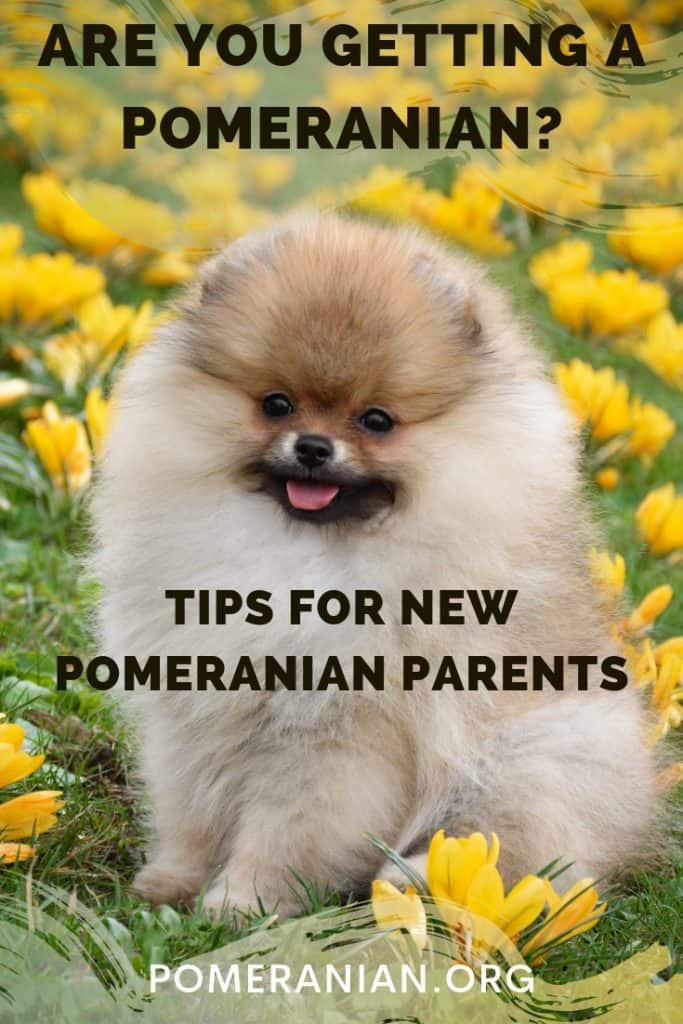
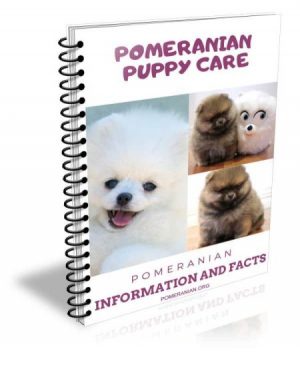
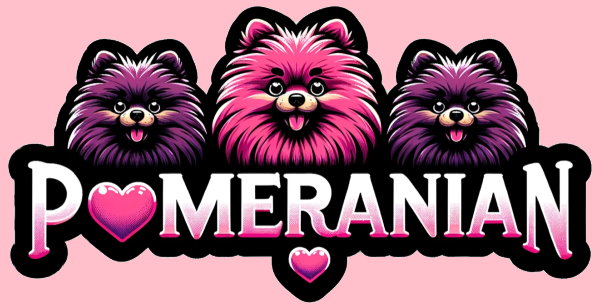












![New Upgrade Dog Playpen Mat Crate Mat Puppy Pads,Leak-Proof Dog Crate Pad,Anti-Slip Bottom[PLAYPEN NOT Included !!!] Reusable Whelping Playpen Crate Reusable Washable Pet Mattress Pad Pet Training Pad](https://m.media-amazon.com/images/I/51RzSDcTSSL._SL160_.jpg)













